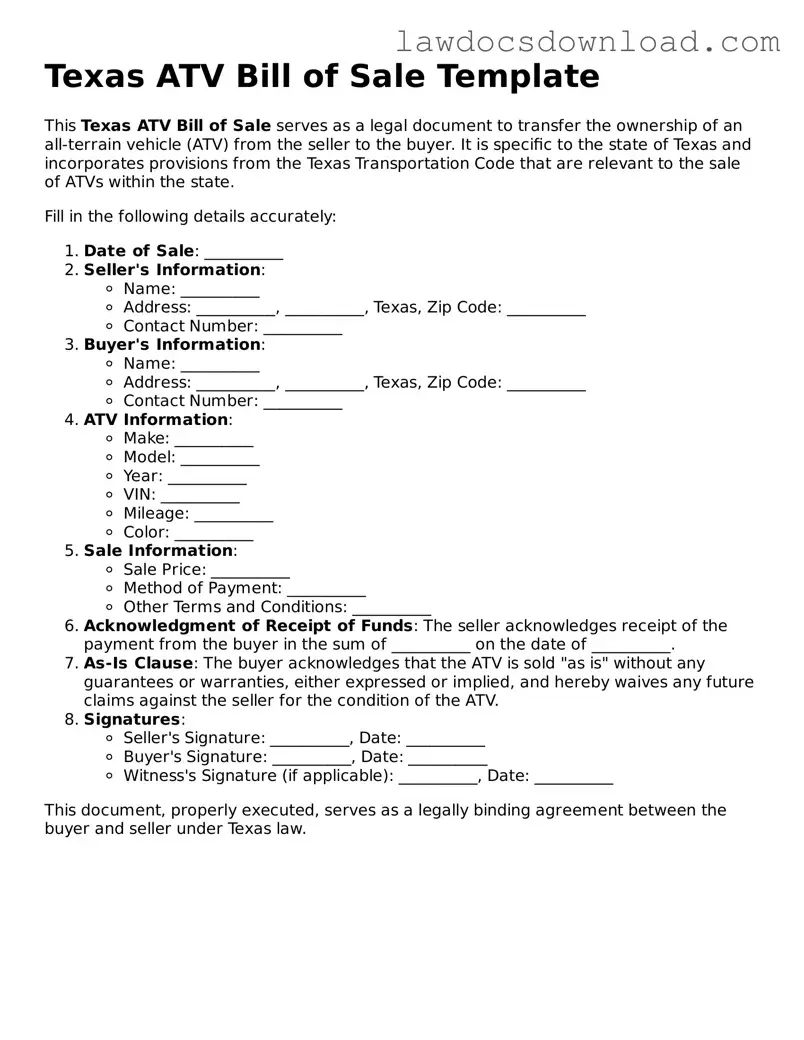The Texas ATV Bill of Sale form closely resembles the Motor Vehicle Bill of Sale, as both serve as critical evidence in the private sale of a vehicle. They provide a detailed record of the transaction, noting the vehicle's description, sale price, and the names and signatures of the buyer and seller. This documentation proves the transfer of ownership and is necessary for the buyer to register the vehicle.
Similarly, the Boat Bill of Sale operates alongside the same lines as the ATV Bill of Sale, tailoring its content to maritime transactions. It includes specific details about the boat, such as hull identification numbers, length, make, and model, ensuring a transparent transaction. This document plays a pivotal role in the registration process of the vessel under the new owner's name.
The Firearm Bill of Sale also shares similarities with the ATV Bill of Sale, as it documents the sale or transfer of a firearm from one individual to another. Key details such as the make, model, caliber, and serial number of the firearm are documented to ensure a legal transfer. Both documents serve to protect the seller and buyer legally and are valuable for record-keeping purposes.
A General Bill of Sale is comparable in its purpose to an ATV Bill of Sale, though it's more versatile, covering a wide range of personal property transactions beyond vehicles. It includes information about the item sold, the sale amount, and the parties involved, providing proof of transfer and ownership. This document is useful for personal property that doesn't require registration with a government body.
The Equipment Bill of Sale closely parallels the ATV Bill of Sale, focusing specifically on the sale of machinery or heavy equipment. It details the equipment's make, model, condition, and any serial numbers or identifying marks. Its primary function is to document the agreement and transfer ownership rights from the seller to the buyer, ensuring a legal sale process.
Similar to the ATV Bill of Sale, the Pet Bill of Sale is designed for the sale of animals, particularly pets. It includes detailed information about the pet, such as breed, date of birth, health information, and any important characteristics. This document provides peace of mind to both parties by ensuring that the terms of the pet's sale are agreed upon and recorded.
The Trailer Bill of Sale mirrors the structure and purpose of the ATV Bill of Sale, catering specifically to the sale of a trailer. It captures essential details like the make, model, year, VIN, and the sale price, facilitating a smooth ownership transfer process. This paperwork is indispensable for the buyer when registering the trailer in their name.
Business Bill of Sale parallels the ATV Bill of Sale in its primary function — documenting the sale and transfer of ownership of business assets or interests from one party to another. It proves the transition of ownership and specifies the sale price, describing the assets transferred. This document is crucial for the buyer to establish legal ownership of the purchased business assets.
The Aircraft Bill of Sale shares a similar foundation to the ATV Bill of Sale, focusing on the sale of airplanes or other aircraft. It includes specific data pertinent to aviation, such as the make, model, serial number, and FAA registration number, ensuring a documented agreement between purchaser and seller. This bill is a vital step in the aircraft registration process post-purchase.
Lastly, the Furniture Bill of Sale functions akin to the ATV Bill of Sale but is designed for transactions involving pieces of furniture. It lists important details about the furniture sold, including description, condition, quantity, and sale price. This document safeguards both buyer and seller by providing a formal acknowledgment of the sale and transfer of ownership of the furniture.

